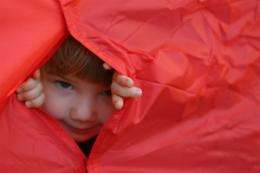(Medical Xpress) -- A recent study from the Centre for Emotional Health, Macquarie University, has found children with social phobia are judged as less attractive and are less liked by their peers, than children without anxiety disorders.
The study conducted by M Barrow, J Baker and J Hudson had children watch video footage of their peers delivering a brief speech. Children with an anxiety disorder, specifically those with social phobia, were less liked and perceived as less physically attractive than non-anxious children.
According to the study, perceived attractiveness was highly related to poor micro social skills, and it is possible that this may have lead to the harsher judgment of attractiveness.
“Perceived physical attractiveness accounted for a significant degree of variance in peer liking,” says Dr Jess Baker. “Once physical attractiveness was considered in analyses, observed anxiety or having an anxiety disorder was no longer significant determinants of peer liking. This suggests that physical attractiveness is a stronger predictor of peer liking than the child’s anxiety”.
Social phobia is common among both adults and children with around seven per cent of the population experiencing a marked fear of negative evaluation from others in social or performance situations. Social phobia typically begins in early life with approximately half of socially anxious adults experiencing symptoms before the age of 11.
The findings highlight the specific relationship between social phobia and peer dislike and demonstrate the importance of observed anxiety and perceived physical attractiveness in determining peer dislike.
“It’s important to recognise the impact that social phobia can have on children. Children with social phobia are less likely to have close friendships, are more likely to drop out of school and can experience real issues in later life,” says Baker.
Provided by Macquarie University



















